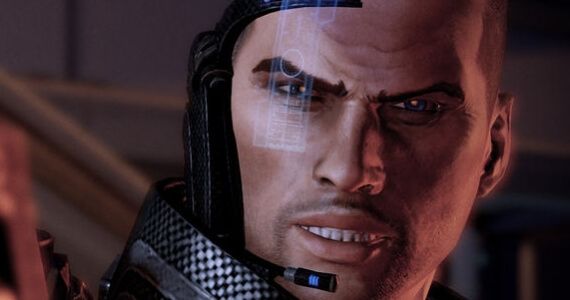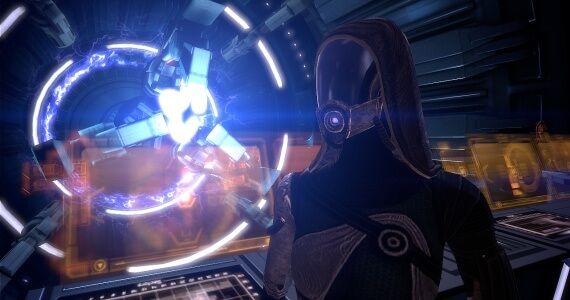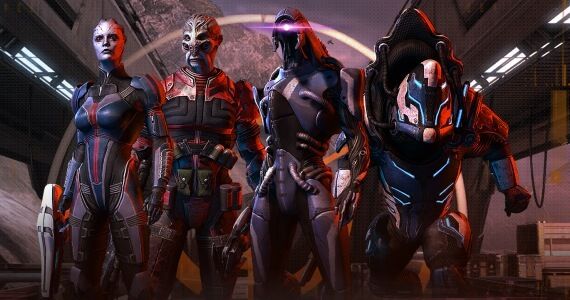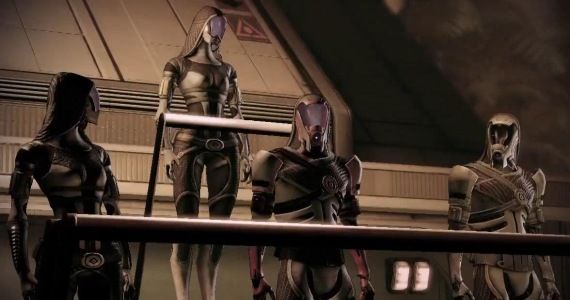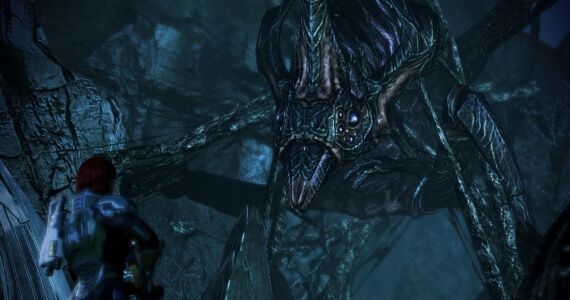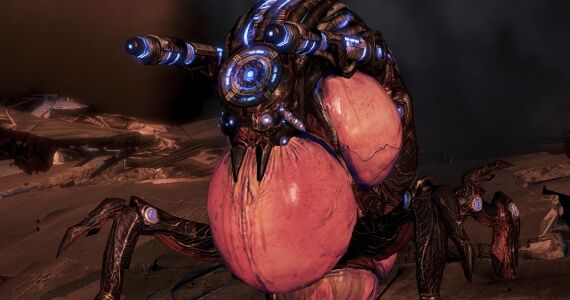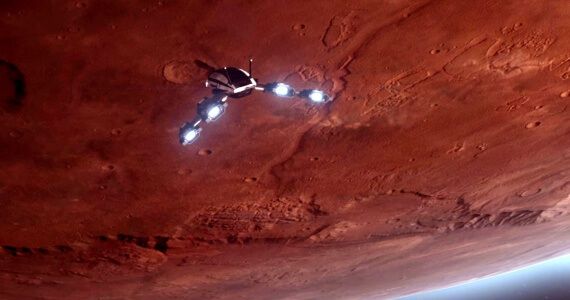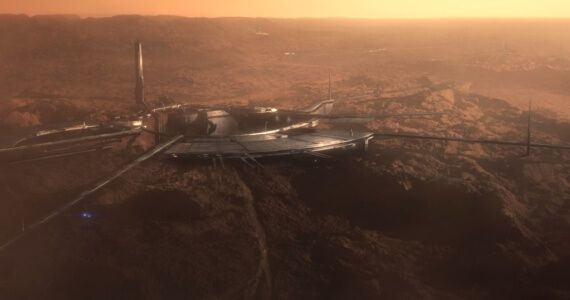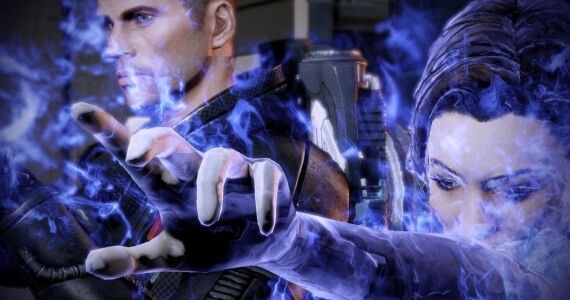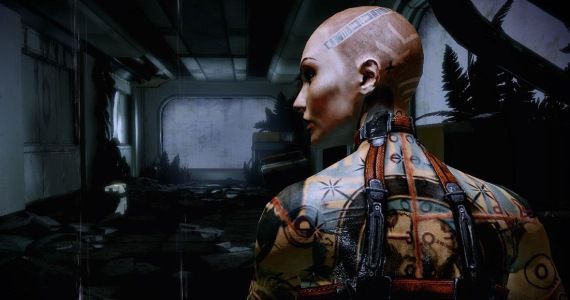The dust has settled from the storm of controversy that followed the epic release of Mass Effect 3, and the multitude of changes brought with the Extended Cut DLC. But now that we've had time to come to terms with exactly what did and did not take place in BioWare's end to the trilogy, we can't help realizing that several loose ends we'd hoped to see tied up simply were not.
Despite what the extra end content brought, and what the newly-released Leviathan story DLC will expand upon, we're still scratching our heads on a few key issues.
It would be unreasonable to think that the development team would answer every single question raised in Mass Effect 3, since the entire Mass Effect series has explored more than a handful of elements of science fiction and galactic history. But it's not just the vague answers or avoided resolution we take issue with, but the extremely promising aspects of the fiction that were forgotten altogether.
There are sure to be more than just these nagging plot threads that the franchise's fans still cling to, but we've narrowed down the areas we personally feel could have used a bit more attention.
-
1. Element Zero/Dark Energy
Anyone who was more than a little interested in the science fiction technology behind the game's universe likely realized one thing before long: science fiction isn't what BioWare was really interested in. Despite naming their gaming franchise after a scientific phenomenon known as the 'Mass Effect,' the means through which 'Dark Energy' is harnessed to allow Faster-Than-Light travel were quickly cast aside in favor of blockbuster action.
For science-fiction fans, the type of technology that was made possible by the titular phenomenon was some of the best seen in a video game in years. By imparting infinite mass to infinitesimal pieces of metal, the need for large and cumbersome weapon ammunition was gone. The plausible conceit allowed soldiers to fire their weapons ad infinitum, worrying only about their weapons overheating. The need to scrounge the battlefield for ammunition or clips was happily alleviated, and all because of the science fiction the developers had come up with.
Until Mass Effect 2 came along, and turned those weapons into... guns. Guns that need clips to function. For Mass Effect 3 those guns got a lot cooler, but this was just one way that the science fiction was used to distinguish itself from other futuristic shooters, rather than serving as grounds for exploration. As a result, the impact that the harnessing of 'Element Zero,' a chemical element outside of our own periodic table was only seen in military applications. We're not saying that the games should have been less exciting or removed from the battlefield (not right now anyway), but it's hard to think that the writers showed the most innovative aspects of their universe.
Physicists and technological innovators could line up to provide insights into just how massively human life could be affected by the discovery of an element with zero Atomic weight. How many incredible catastrophes could take place when traveling faster than the speed of light? How would Earth's societies function with that kind of power at their disposal? These were issues that might normally be explored in the extended novels as well, but the original game's interest in elements of life not being attacked by bullets or grenades faded quickly. As a result, the promise of the 'Mass Effect' was never really explored to the extent that we would have liked.
Nor to the extent that the writer of the first games, Drew Karpyshyn would have liked. He's even gone on record saying that the original series was supposed to be all about dark energy, with the Reapers once living beings that were wiping out sentient life to keep dark energy from destroying the entire galaxy. Biotics and advanced travel would send dark energy out of balance once galactic civilization got too large, demanding that it be purged to prevent annihilation. Ultimately these building blocks proved fruitless, and we can't help but feel that it shows.
-
Next: The Aliens
2. The Aliens
We don't mean the intricacies of Krogan mating rituals, or those Elcor who we now know charge into battle with cannons mounted on their backs. Well, we don't just mean that. The alien societies of the Mass Effect universe were as deep and different as cultures here on Earth, but the campaigns of the series only ever allowed the smallest of insights into their inner workings. It made sense for the first two games, as humanity had only began to build some respect in the intergalactic community, but Mass Effect 3 seemed like the perfect opportunity for players to experience different planets and cultures firsthand.
When looking back on Mass Effect 2, the drama surrounding Tali and her place among the Migrant Fleet stands out. Why? Because BioWare managed something particularly impressive: throw a player into the political maneuvering of an alien military tribunal, and keep them invested by having the impacts affect not only their own character (who has to survive and continue fighting) but a close friend and teammate. We didn't realize it at the time, but facing a challenge that didn't rely on proficiency with a gun wasn't a forming trend, but was practically a one-off.
Unfortunately, the chance to do that same weaponless exploration and political maneuvering - not to mention investigation into previously archetypal alien races - with the Turians, Asari or Salarians never came. Traveling to recruit Turian support in Mass Effect 3 took place on a remote, lifeless battlefield, offering only a look at the military prowess of the... military race. The story was the same with the ancient, wise and spiritual Asari: their historic and religious relics were all Shepard really got to explore. In the end, the only real exploration of the differences between alien races takes place in the Mass Effect novels.
We can't help but feel that that's a shame, since seeing the fiction at work would have been far more satisfying, and a possible launch point for future games in the series. Oh, well.
-
Next: The Rachni
3. The Rachni...'Threat'?
Any conversation among friends about the letdowns or fake-outs of the Mass Effect trilogy has to touch upon the decision made in the first game to either save, or exterminate, the Rachni Queen and her offspring. The capture and enslavement of the Rachni by Cerberus led to human experimentation and sacrifice, and outright chaos. The Rachni Queen's final appeal to Commander Shepard - that her freedom would result only in prevention of Rachni extinction, not another galaxy-wide invasion - faced the player with one tough decision. Tough for some, at least.
For those who looked deeply into the choice being made, the stakes couldn't have been higher. Could Shepard eradicate an entire sentient race because they might pose a threat to others? Or would Shepard let them go free, and bear the responsibility of whatever future course they took? Whatever the case, the significance didn't ever extend beyond the choice itself. Freeing the Rachni from bondage only ever led to them being once again enslaved in Mass Effect 3, facing Shepard with essentially the exact same question yet again. Had the player chosen to wipe them out... well, that never really affected anything either.
The Rachni choices are problematic for us since they represent one of the biggest issues we have with the trilogy, having placed 'player impact' at the top of their priorities in wrapping up the series. Shepard's decisions with the Geth were paid off quite well, and brought to closure in Mass Effect 3 for yet another of the game's brightest moments. But what of the Rachni? Where did they land? How have they recovered? Do they actually have a fate beyond bondage and enslavement? Will lives be lost because some Commander Shepards decided their salvation was worth the risk?
For a sense of what we're getting at, one need look no farther than Dragon Age: Origins. In the case of Dwarven royal succession, the player's choice to support the candidate who didn't favor murdering his enemies and casting off of all tradition led to (Spoiler Alert) the Dwarven culture and trade being closed off from the larger world, halting progress and diplomacy. The player's decision, based on moral grounds, seemed obvious at the time. But from a political and cultural standpoint, the choice ultimately had negative, but accurate, results. With a plot ostensibly built on political and racial issues, we'd expected at least the same from BioWare's flagship franchise.
In hindsight, it's possible that the developers at BioWare would have placed less emphasis on the Rachni choice, seeing as it lacked a profound payoff - aside from a powerful enemy type for multiplayer. That seems like short shrift for a species that offered one of the first chances for Shepard to shape the future of the galaxy directly. The upside is that the mystery of the Rachni's fate could be answered in DLC form, so there's still a chance for players to truly regret, or take pride, in their decisions.
More importantly, the Rachni as a species still remain mysterious. Clearly intelligent and meaning no ill will (at least, that's the Queen's story to Shepard) their initial aggression towards all galactic life doesn't quite fit with the Queen's calm diplomacy, or the race's ability to achieve space travel. The Krogan were painted as mindless, brutal killers, but that is far from the truth. Could the same be true of the Rachni?
-
Next: Prothean Ruins on Mars
4. This All Started on Mars, Right?
Prothean ruins. They're not just what kicked off the campaign of the very first Mass Effect game, but what informed humanity that they were absolutely not alone in the universe. In the Mass Effect fiction, the discovery of the Martian Prothean ruins in 2148 threw humanity forward in terms of technology, since it wasn't just stone tablets that were uncovered below the Red Planet's sandy surface. A mass effect core and starships built to utilize it to achieve Faster-than-Light travel showed that the Protheans were not only advanced, but extremely interested in Earth.
What scientists translated from the Mars archives was that Cro Magnon man was the subject of Prothean study, both within the system and beyond. While the motives of the extinct civilization were never clear, the signs all pointed to a special place for humanity in their greater plans, even leaving behind the tools we'd need to discover the rest of the Council races. Unfortunately, the intention of the developers to explain that connection was tossed aside with the previously-mentioned element-zero-will-destroy-the-galaxy issue.
According to Drew Karpyshyn, the Protheans saw the far more varied and nuanced nature of humans as the genetic diversity that just might be able to stop the spread of the dark energy imbalance. Given that, the seemingly gifted placement of humanity among well-established societies, not to mention the formation of a human Reaper makes far more sense. Of course, the story quickly changed to focus on far more immediate and militaristic issues. That's well within the rights of those directing the series, but it still leaves all those Martian threads dangling.
They could have come up with another reason for the Martian ruins being significant, beyond simply saying 'that's what let us meet aliens,' but that never did happen. And if missing the opportunity wasn't enough torture, the Mass Effect 3 campaign even sends the player to Mars immediately, with more combat encounters than actual exposition as reward. Just when it seems that Mars - the center of science fiction speculation since the beginning of literature, and of recent space exploration - will finally give up some satisfying answers, or confirmation that one human rising to save the entire galaxy isn't just due to his being the player-controlled-character, we're left to accept what's already been explained.
The mysteries contained on the desolate Prothean world of Ilos got some screen time and elaboration with the 'From Ashes' DLC, so hopefully Mass Effect 3 will feature a return to the Red Planet as a means for expanding the fiction as well. The Leviathan DLC proves that there are still some aspects of the Reapers and ancient synthetics to uncover, so why can't humanity receive the same treatment?
-
Next: Biotics
5. Biological Attacks on Humans...By Humans?
It is unfortunate that the cutting-out of element zero and dark energy manipulation from the Mass Effect series' plot meant the ramifications of such technology were only witnessed through the narrowest of scopes. But the mysterious element, and its connection to those imbued with Biotic abilities was one of the most intriguing points of fiction seen in the original game. For those who don't know exactly what makes Biotics so special and unlike the average member of their respective species, allow the official in-game Codex to explain:
"Most organic species are capable of developing biotic abilities, though there are risks involved. Biotics are the result of in-utero exposure to element zero. This usually causes fatal cancers in the victim, but in rare cases it coalesces into nodules within the fetus's developing nervous system."
Take one of these individuals who have been fortunate enough to develop nodules, not cancer, implant them with a Biotic Amp to harness dark energy with greater efficiency and skill, and you have a potent soldier for any war. Of course, that all relies upon pregnant mothers coming into contact with element zero. And for humanity, the first run-ins with the element came from explosions or meltdowns of spaceship engines running on 'eezo.' And that's where things get interesting.
It all comes down to a single sentence in the Mass Effect Codex, alluding to doubts about just how "accidental" the first catastrophes truly were. In other words, there are those who suspect that the first successful human Biotics - the unborn children who escaped terminal cancer from contact with element zero dust - were exposed to the element against their will. It may not be much, but a story like that gets imaginations reeling, with the ethical and moral implications of those behind the experiments. Add to that the fact that earlier-generation Biotic Amps resulted in excruciating migraines for the remainder of the subject's life, and you've got the makings of an interesting fight.
If it was Earth's government that planned the 'accidents,' who is there for Shepard to fight? If it was private corporations, would they be punished, given how much progress occurred as a result? How are more Biotics being formed now that accidents are presumably less frequent? Do parents volunteer? Is that service admired, or looked down upon? These are all corners of the universe created for Mass Effect that would no doubt hold some interesting tidbits, but all they ever earned was a throwaway mention.
Given the presence and popularity of the street drug 'Red Sand' among humans - an inhaled depressant that grants Biotic abilities for a short time - there would be some who saw Biotics as blessed and fortunate, regardless of the means to produce them. Seeing as the narcotic only ever appeared in the novels, the allure and moral minefield that Biotics represent were just too big for the fast-paced-shooter to deal with to any extent.
-
There are more questions that our overly-analytical and science fiction-obsessed minds have struggled over since Commander Shepard's first appearance, but these five are ones we feel could have made the games richer while also staying committed to more than just action and shooting. BioWare has maintained that the Mass Effect universe is too rich and deep to abandon altogether, so there is always a chance the more games could mean more cerebral or niche releases as well.
Failing that, us science fiction fanatics will just have to hope for more novels to delve into the issues detailed above... provided they don't turn out like the most recent travesty. It seems no medium is safe.
Feel free to share your own thoughts with us, along with the questions, characters, or element of sci-fi that you felt deserved more attention in the Mass Effect series. The Leviathan DLC will be the first chance BioWare has to expand on the existing story, available for $9.99 download today on the Xbox 360, PS3 and PC.
-
Follow me on Twitter @andrew_dyce.

